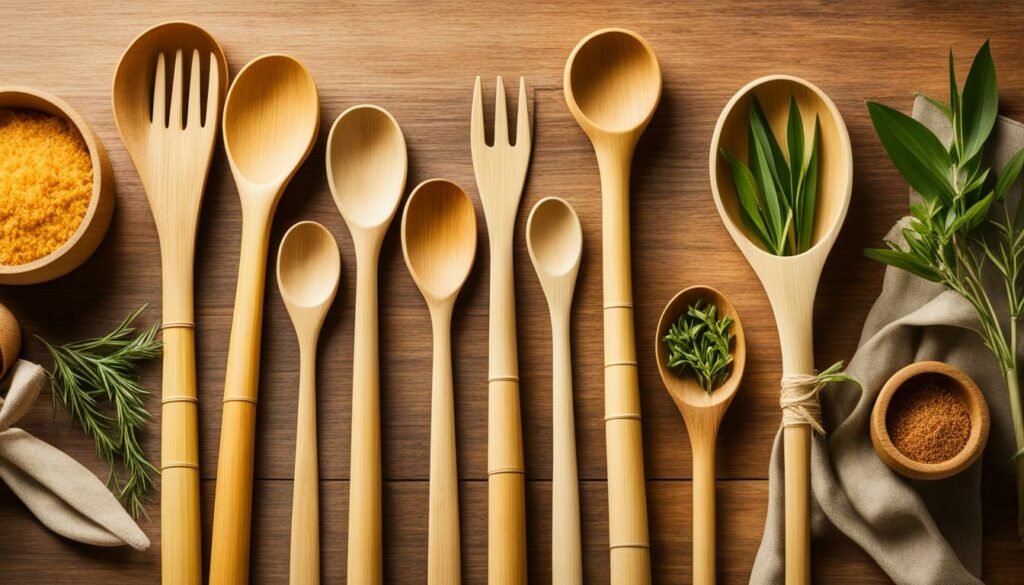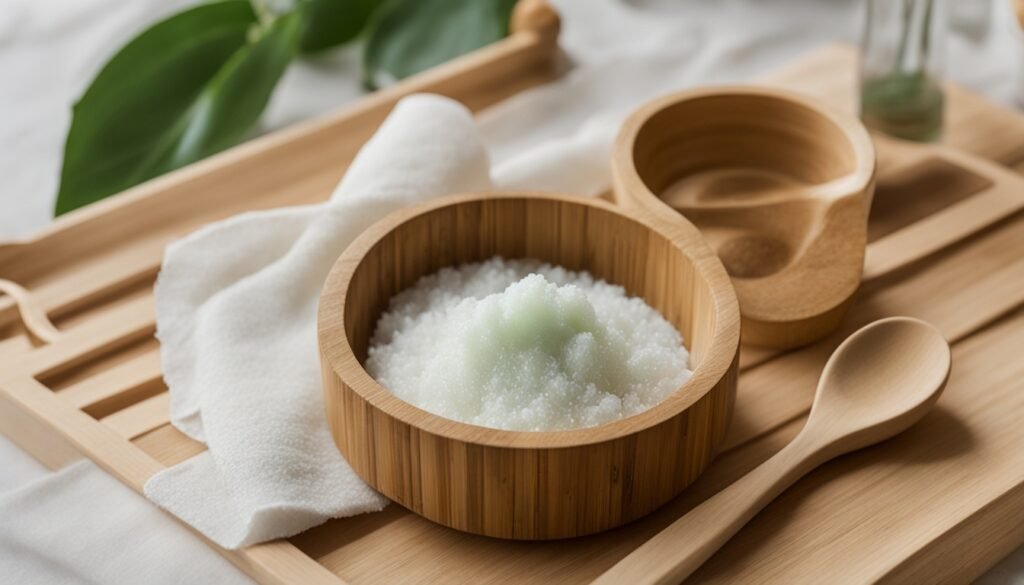Did you know that over 300 million tons of plastic are produced annually? A significant portion of this ends up in our landfills and oceans. This fact underscores the critical need for a shift towards sustainable living. Adopting a zero waste lifestyle has been transformative for me, offering numerous benefits for the planet and my health.
Switching to plastic-free alternatives doesn’t have to be daunting. By replacing single-use items with eco-friendly options, we can make a substantial impact on the environment. This guide will delve into various zero waste products suitable for everyday use, such as kitchen tools, shopping accessories, and personal care items. Join me as we explore how to integrate these products into our lives for a sustainable future.
Understanding Zero Waste Living
Zero waste living is a comprehensive approach focused on eliminating waste, moving beyond just managing it. It advocates for circular consumption, promoting products designed for reuse, recycling, or composting. The aim is to minimize disposal, fostering a lifestyle that aims to eliminate all waste when feasible.
What Does Zero Waste Mean?
Essentially, zero waste living means a dedication to reducing waste across all life areas. It requires recognizing that every item we use impacts the planet. By choosing a plastic-free lifestyle, I can help reduce waste. It’s about being mindful of product lifecycles to select sustainable options. For more on zero waste strategies, check out this detailed article on zero waste principles.
The Philosophy Behind Zero Waste
The zero waste philosophy is driven by a desire to safeguard our environment for future generations. It encourages individuals to examine their habits and their consumption’s broader effects. By questioning wasteful habits, I can adopt a sustainable mindset focused on waste reduction. Embracing zero waste encourages a deeper connection with resources, leading to a more thoughtful lifestyle.
Sustainable Kitchen Essentials
Adopting a zero waste lifestyle in the kitchen begins with thoughtful choices in food storage and waste management. A variety of sustainable kitchen essentials can significantly cut down on plastic use and foster an eco-friendly environment. Here are some top solutions to consider.
Plastic-Free Food Storage Solutions
For replacing traditional plastic food storage, glass jars are a standout choice. They maintain food freshness and can be reused without degrading. BPA-free ceramic containers from Caraway are ideal for long-term food storage. Furthermore, stainless steel containers from ECOlunchbox offer a durable alternative to plastic wrap. These choices not only support a plastic-free food storage approach but also enhance kitchen health.
Composting Bins for Easy Waste Management
Composting in the kitchen is a practical approach to managing organic waste. Composting bins vary, from natural collection bins to innovative indoor worm farms from Uncommon Goods. For those with outdoor space, Subpod efficiently converts food scraps into nutrient-rich compost. Easy composting practices contribute to sustainable waste management and benefit the environment.
Reusable Beeswax Wraps as Alternatives to Plastic Wrap
Reusable beeswax wraps are an excellent, sustainable alternative to traditional plastic wrap. Brands like Bee’s Wrap and Khala & Co. offer eco-friendly options ideal for wrapping food or covering bowls. These wraps not only reduce single-use plastic waste but also offer versatility and durability. Caring for these wraps is straightforward, making them a valuable addition to any kitchen.
| Product Category | Examples | Benefits |
|---|---|---|
| Plastic-Free Food Storage | Glass jars, Ceramic containers (Caraway), Stainless steel containers (ECOlunchbox) | Reusable, Safer for food, Reduces plastic waste |
| Composting Bins | Indoor worm farms (Uncommon Goods), Outdoor composters (Subpod) | Aids in waste reduction, Produces nutrient-rich compost |
| Reusable Beeswax Wraps | Bee’s Wrap, Khala & Co. | Reduces single-use plastic, Versatile and durable, Easy to clean |
Recommended Zero Waste Shopping Products
Adopting a zero waste lifestyle is a powerful step towards environmental conservation. It simplifies daily tasks and fosters a healthier planet. Here are some top zero waste products I endorse for those transitioning to sustainable living.
Bamboo Utensils for On-the-Go Meals
For dining out, I always have bamboo utensils on hand. These utensils are lightweight, durable, and an excellent alternative to disposable plastic. Companies like To-Go Ware and Jungle Culture offer stylish bamboo sets that fit easily in my bag. By using bamboo, I support a plastic-free lifestyle and demonstrate my dedication to zero waste. These utensils allow me to enjoy meals on the go without adding to plastic waste.
Eco-Friendly Cleaning Supplies
Keeping a home clean requires eco-conscious cleaning products. I trust brands like Blueland for their refillable containers. These products reduce plastic waste and support zero waste cleaning. Often, I opt for natural alternatives like vinegar and baking soda, which are effective and safe for the environment. These choices reflect my pledge to a cleaner planet.
Reusable Bags for Grocery Shopping
Reducing plastic use is straightforward with reusable grocery bags. I prefer high-quality organic cotton bags that are both fashionable and durable. These bags help me avoid hundreds of plastic bags annually. ZeroWasteStore.com offers a broad selection of these alternatives, making them crucial for a plastic-free lifestyle. Using these bags simplifies shopping and underscores my environmental contributions.

| Product Type | Brand | Sustainability Feature |
|---|---|---|
| Bamboo Utensils | To-Go Ware | Biodegradable and reusable |
| Eco-Friendly Cleaning Supplies | Blueland | Refillable containers, reducing plastic waste |
| Reusable Grocery Bags | ZeroWasteStore.com | Made from organic cotton, washable and durable |
Zero Waste Bathroom Products
My bathroom is a key area for waste generation, mainly due to the numerous plastic-packaged products. By adopting plastic-free bathroom products, I can significantly reduce my environmental footprint. I’ve found several zero waste personal care items that benefit both the planet and my health.
Plastic-Free Personal Care Items
Choosing sustainable grooming products has transformed my daily routine and supports eco-friendly habits. For example, I prefer bar soaps from Ethique, which have minimal packaging. Bamboo toothbrushes from EcoRoots replace plastic, and biodegradable floss from ZWS Essentials keeps my dental care green and landfill-free.
Reusable Razors and Deodorants
In my journey towards zero waste grooming, I’ve embraced reusable razors like the safety razor from EcoRoots. This choice cuts down on plastic waste and provides a closer, more comfortable shave. Moreover, switching to eco-friendly deodorants in recyclable packaging from Bite and Meow Meow Tweet has been a game-changer. These products prove that a zero waste lifestyle is both fulfilling and cost-effective.

| Product Type | Examples | Benefits |
|---|---|---|
| Personal Care | Bar soaps, bamboo toothbrushes, biodegradable floss | Reduces plastic waste, healthier options |
| Grooming | Reusable razors, eco-friendly deodorants | Cost-effective, sustainable alternatives |
Conclusion
Embarking on a zero waste lifestyle starts with mindful choices in daily products. It’s astonishing how minor changes can significantly impact sustainability. From kitchen essentials to plastic-free bathroom items, every product is vital in my eco-friendly journey.
This article showcased various zero waste products that aid in a greener home. By integrating these items into my routine, I not only cut down on waste but also inspire others to adopt similar habits. The tips for zero waste shopping serve as a starting point for those eager to begin their sustainable path.
It’s all about embracing a mindset of environmental responsibility and seeking practical solutions that align with my lifestyle. For deeper insights on waste reduction and sustainable living, check out this useful resource. Through thoughtful actions and informed decisions, we can all contribute to a more sustainable future.


